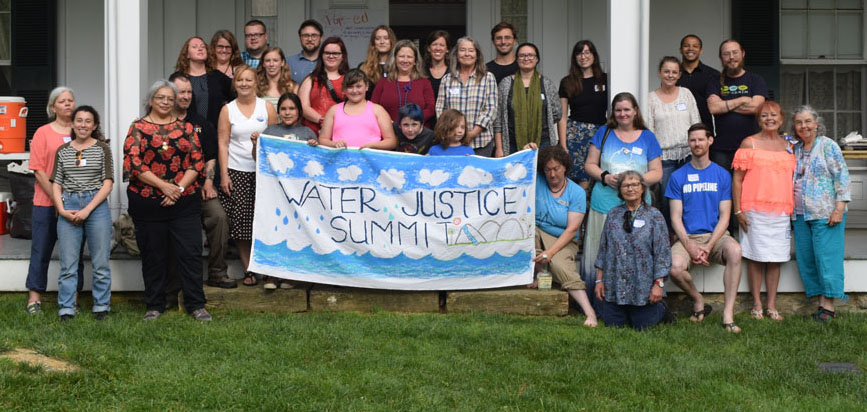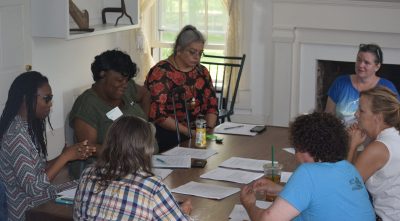This blog post was co-authored by Lara Mack, Virginia Field Organizer, and Ridge Graham, North Carolina Field Organizer.
On a recent Saturday morning, attendees of the Water Justice Summit in Blacksburg, Va., participated in an opening water ceremony by forming a circle and standing silently outside Solitude – a historic house tucked between old trees on Virginia Tech’s campus, praying together and honoring water. They brought beloved water from their homes (tap, rain bucket, favorite spring, or creek) and poured a trickle in a large bowl that would hold the water from the numerous watersheds throughout the day. The ceremony set a tone of honoring the priceless resource — our planet’s lifeblood — that participants felt called to protect, and celebrating the joy and life it gives us.
“The water blessing was one of the most powerful ones I have experienced,” said Mara Robbins, a summit attendee and resident of Floyd, Va. “Combining our water from so many places, cherished and carried to our circle, helped to weave the event together into something we could bring home with us to our individual ecosystems.”
The principles at the foundation of the Water Justice Summit were:
- Clean water is necessary for life. It is a human right and a common good we all must protect.
- We are honored to learn from the foundation of wisdom and leadership of those who are fighting for justice in the broadest sense, especially indigenous people, people of color, women, queer, trans, and other gender-nonconforming individuals.
- Real solutions to water quality and access issues must be derived from communities. Corporate solutions to water justice issues are not solutions.
- The earth is an interdependent community, and water is the source of our interdependence. We are all up or downstream from one another.
The event brought together water defenders and community activists from across Central Appalachia, including Martin County, Ky., Montgomery County, Va., and Claiborne County, Tenn. We were even joined by environmental advocates from South Carolina and Utah.
The Water Justice Summit created an opportunity for community members from different areas, whose water is imperiled by a variety of industrial threats, to network with each other, share stories, strategize, share skills and build affinity. Attendees brought vast experiences to share — working to repair their rural municipal water systems, clean up coal slurry defend against fracked gas pipelines, and fight for indigenous sovereignty.
The day before the summit, we participated in a collaborative exhibit entitled “What Color is Water?” which featured water from local sources, watercolor art from students of all ages, and quotes and statements about water contamination. Afterwards, there was a “Mothers for Water Justice Panel” which featured four mothers fighting to protect water.
”The panel offered deep insight into diverse intersecting issues through the lenses of four powerful women who are truly water warriors in a world that desperately needs them,” Robbins said. “It was encouraging to see so many people from my community gleaning the wisdom they had to offer. I was especially appreciative of the indigenous voices and the respect they were offered in that sphere.”

Virginia resident Mara Robbins (l) talks with Appalachian Voices’ staffers Lara Mack and Ridge Graham.
“Listening to truth-tellers’ stories inspired me to action,” said Lib Hutchby, an advocate from Wake County, N.C. “The summit was planned skillfully, allowing our emotions and our need for knowledge to be shared in a safe space, forming a diverse community of water protectors ready to use our tools to stop pipelines.”
The Water Justice Summit would not have been possible without the help and support from Appalachian Voices, The Alliance for Appalachia, POWHR Coalition, Young Appalachian Patriots, The Stay Together Appalachian Youth Project and our Virginia Tech partners: The Institute for Peace Studies, The Appalachian Studies Department, The Gloria D. Smith Professorship in Africana Studies, The Perspective Gallery, and The Institute for Policy and Governance.





Thank you for your good work. Water for everyone!
Love your Mother!